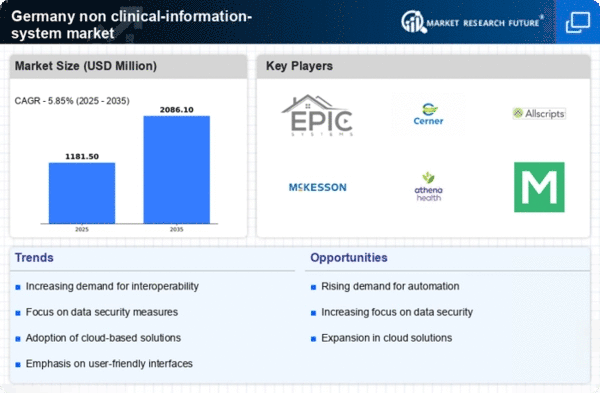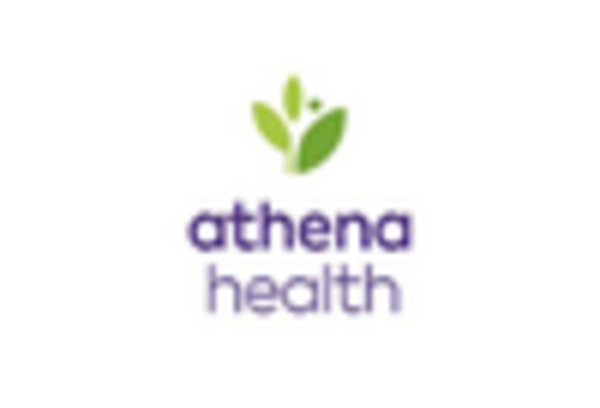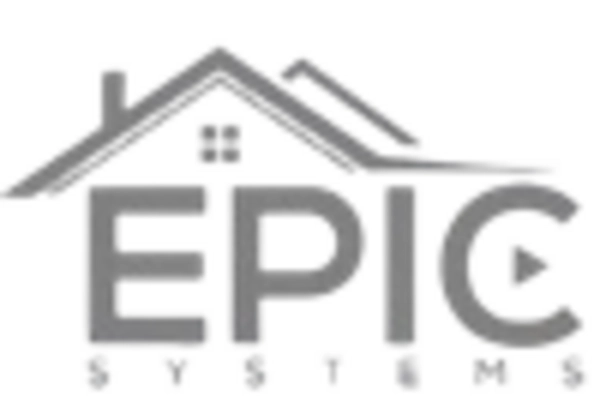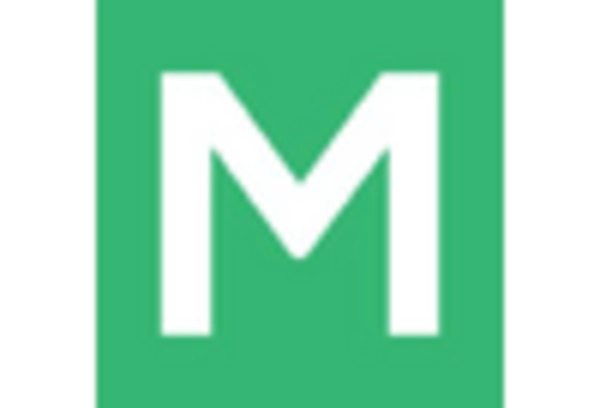Rising Demand for Data Security
The non clinical-information-system market in Germany is experiencing a notable increase in demand for robust data security measures. As healthcare organizations handle sensitive patient information, the need for secure systems has become paramount. In 2025, it is estimated that approximately 70% of healthcare providers in Germany prioritize data protection in their technology investments. This trend is driven by stringent regulations such as the General Data Protection Regulation (GDPR), which mandates strict compliance for data handling. Consequently, vendors in the non clinical-information-system market are focusing on developing advanced security features, including encryption and access controls, to meet these regulatory requirements. The emphasis on data security not only protects patient information but also enhances the overall trust in healthcare systems, thereby driving market growth.
Shift Towards Digital Transformation
Digital transformation is reshaping the non clinical-information-system market in Germany, as healthcare organizations increasingly adopt technology to improve operational efficiency. In 2025, it is projected that around 60% of healthcare facilities will implement digital solutions to streamline administrative processes. This shift is fueled by the need to reduce costs and enhance service delivery. Non clinical-information-systems play a crucial role in automating tasks such as billing, scheduling, and patient management, allowing healthcare providers to focus on patient care. The integration of digital tools not only improves workflow but also facilitates better data management and reporting. As organizations recognize the benefits of digital transformation, investment in non clinical-information-systems is expected to rise, further propelling market growth.
Growing Emphasis on Patient Engagement
In Germany, the non clinical-information-system market is witnessing a growing emphasis on patient engagement strategies. As healthcare providers recognize the importance of involving patients in their care processes, there is a shift towards systems that enhance communication and interaction. By 2025, it is anticipated that over 50% of healthcare organizations will implement patient engagement tools, such as portals and mobile applications. These systems enable patients to access their health information, schedule appointments, and communicate with providers more effectively. The focus on patient engagement not only improves patient satisfaction but also fosters better health outcomes. Consequently, the demand for non clinical-information-systems that support these initiatives is expected to rise, driving market growth.
Increased Regulatory Compliance Requirements
The non clinical-information-system market in Germany is significantly influenced by the evolving landscape of regulatory compliance. In 2025, healthcare organizations are expected to allocate approximately 15% of their IT budgets to ensure compliance with various regulations. This includes adherence to standards set by the Federal Ministry of Health and other governing bodies. As regulations become more stringent, the demand for non clinical-information-systems that can facilitate compliance reporting and data management is likely to increase. Vendors are responding by enhancing their offerings to include features that simplify compliance processes, such as automated reporting tools and audit trails. This focus on regulatory compliance not only mitigates risks for healthcare providers but also drives the adoption of advanced non clinical-information-systems.
Advancements in Analytics and Reporting Tools
The non clinical-information-system market in Germany is benefiting from advancements in analytics and reporting tools. As healthcare organizations seek to leverage data for informed decision-making, the demand for sophisticated analytics capabilities is increasing. In 2025, it is projected that approximately 40% of healthcare providers will invest in analytics solutions to enhance operational performance. These tools enable organizations to analyze patient data, track performance metrics, and identify areas for improvement. The integration of advanced analytics into non clinical-information-systems allows for real-time reporting and insights, which are crucial for strategic planning. As the focus on data-driven decision-making intensifies, the market for non clinical-information-systems that offer robust analytics features is likely to expand.
















